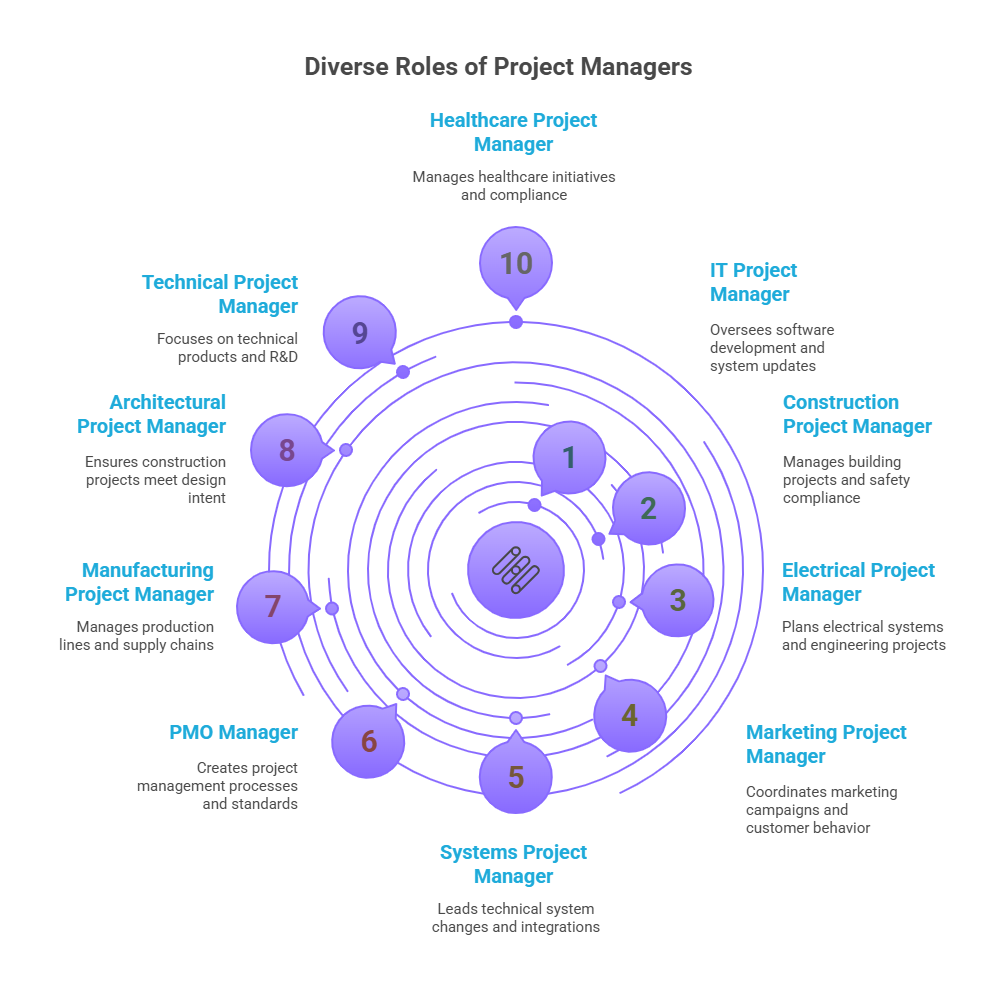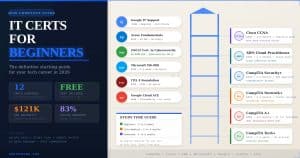Project management isn’t a job for one personality type or one background. You will find project managers inside creative agencies, on construction sites, in IT war rooms, and even in hospitals. Each has their own game plan. So if you’re wondering what types of project manager jobs are out there, or trying to figure out where you fit in the context of different project management roles, this breakdown will make it easier to map it all out.
Let’s talk about different types of project managers, how they work, what they handle, and which paths are actually growing in 2026, along with the growth opportunities available .
The Core Idea: What Project Managers Actually Do?
Let’s strip it down. Here’s exactly what a project manager handles: projects. From that first kickoff meeting all the way to the final handoff, project managers oversee timelines, budgets, people, resources, and all the expectations that get piled onto a project.
But here’s the part many people don’t fully get, a good project manager isn’t just sitting around giving orders. They aren’t simply pushing tasks onto others. They’re right in the thick of it, actively involved in every stage. They build project schedules, coordinate between multiple teams, manage the budget closely, and keep their eyes locked on the project success criteria. That success might mean finishing on time, staying under budget, or hitting a specific business goal.
Regardless of which industry you’re looking at, whether it’s marketing, construction, IT, or manufacturing, project managers play the same core role. They’re the glue that holds everything together, even when projects start to wobble.
Now, let’s get into what almost every project manager does, no matter what type of project they’re running:
Breaking Big Goals Into Small, Clear Tasks
Projects don’t start with easy, bite-sized steps. They usually begin with big goals that seem overwhelming. One of the first jobs for a project manager is to break that giant goal into smaller, manageable tasks that different teams can realistically handle. This makes it easier to track progress and helps prevent the project from stalling.
Assigning Those Tasks Across Project Teams, where the project leader plays a crucial role.
Project managers don’t do everything themselves. Once they’ve broken down the project, they have to assign the right people to the right tasks. They look at skills, capacity, and deadlines to make sure every piece of the project is in the hands of someone who can get it done well and on time.
Updating Stakeholders or Leadership on Progress
One of the most important things project managers oversee is communication with stakeholders. These might be senior executives, clients, or anyone else invested in the outcome. The project manager has to keep them updated on how things are going, whether the project is ahead, behind, or facing risks. No surprises. That’s key.
Using the Right Project Management Methodology
Not every project runs the same way. That’s why project managers must choose the most effective project management methodology for the job. Sometimes, they’ll use Scrum for fast, iterative work. Other times, Waterfall makes more sense for projects that need strict order. Agile works well for projects with shifting priorities, and Lean methods help cut waste and boost efficiency. Picking the right method can make or break a project.
Troubleshooting Delays, Miscommunications, or Gaps in Resources
Things go wrong in projects. Delays happen. Communication gaps show up. Sometimes there aren’t enough people or money to handle what’s needed. Project managers are the ones responsible for spotting these issues early and fixing them before they grow into bigger problems. This often means adjusting plans, shifting deadlines, or finding extra support.
Wrapping Up With Final Delivery and Project Documentation
Finishing a project doesn’t just mean handing over the product or result. A proper wrap-up involves reviewing everything to make sure it meets expectations, collecting feedback, and closing it off with solid project documentation. That documentation helps others understand what was done, why certain choices were made, and what can be improved next time.
That’s the baseline of what project managers do in any project management job, all aimed at ensuring successful completion. They lead the process from start to finish, making sure nothing slips through the cracks.
Four Personality-Based Types of Project Managers
Before jumping into industries, it’s helpful to know that not all types of project managers think the same way. According to a study by Harvard Business Review, you’ll usually run into these 4 leadership types:
Harvard Business Review did a deep dive into this and found that most project managers generally fall into four broad leadership styles. These styles aren’t about job titles or industries, they’re about how people think and work when managing projects.
Here’s what those types look like:
1. The Executor
This one sticks to the plan. Seriously. Executors love structure and predictability. They’re the ones who’ll follow project schedules, budgets, and project documentation down to the smallest detail. You won’t find them taking unnecessary risks or chasing experimental ideas. They’re great at sticking to proven methods, and they thrive in stable environments where goals, numbers, and outcomes are clearly defined.
2. The Expert
Experts are your data-first thinkers. They are the one of the types of project managers who are analytical, methodical, and laser-focused on logic. These are the project managers who’ll ask for numbers, reports, and hard evidence before making a call. They won’t move forward on a gut feeling, they need facts.
This type tends to shine in fields like engineering projects or tech-heavy industries, where there’s a lot of technical depth or complex systems involved. They love breaking down problems, running analysis, and solving issues through structured thinking.
3. The Prophet
Now, here’s your visionary type. Prophets don’t always follow a clear, mapped-out process. They lean into instinct and future-thinking. They’re ideal for projects where nobody fully knows the path forward yet, like startups, research teams, or creative labs building something completely new.
Prophets tend to think far ahead, and they’re comfortable taking leaps into unknown territory. They might not have all the data in hand, but they’re often willing to bet on a vision they deeply believe in. If you’re dealing with uncertain, high-stakes projects that aim for innovation, Prophets can bring big ideas to the table.
4. The Gambler
The Gambler knows risk is part of the game, but they’re smart about it. This type works best inside a company’s current strategy but isn’t afraid to make bold moves where success isn’t guaranteed. They weigh odds, make strategic bets, and often take on projects that others might avoid due to unpredictability.
You’ll find all four of these types scattered across job titles, industries, and companies. Let’s now check what types of project managers exist in real industries, and where those jobs are heating up.
Breaking Down the Types of Project Managers’ Jobs by Industry
Project managers aren’t limited to one line of work, as they can be found under different job titles . Each sector puts its own twist on the role. Some PMs are hands-on with tech, some are out on job sites, others are launching marketing campaigns or software updates.

1. IT Project Manager
Probably the most searched PM role out there. An IT project manager plans and leads all kinds of software development projects, cloud transitions, system updates, security rollouts, you name it.
You’ll often hear them talk about:
- Code freezes
- Dev sprints
- Sprint planning
- Jira dashboards
- Budget overruns in server upgrades
They work with devs, system admins, vendors, and execs. Strong grip on Agile methodology is a must, though many also switch between hybrid approaches depending on project needs.
2. Construction Project Manager
Construction project managers are boots-on-ground types. They’re overseeing specific building projects, coordinating with engineers, contractors, and safety inspectors.
Think project planning with blueprints instead of slide decks. These PMs keep the entire project on track by watching budget allocations, materials delivery, labor schedules, and safety checks.
What sets this apart:
- Heavy focus on compliance
- Physical safety is a daily concern
- On-site supervision is common
They’re basically managing construction projects from the trenches.
3. Electrical Project Managers
Electrical project managers come into play when power systems, wiring infrastructure, or high-voltage equipment need professional oversight. Think of large-scale engineering projects, like power plants, commercial buildings, or manufacturing facilities.
They partner with electricians, safety inspectors, and construction teams. Their job isn’t just about flipping switches—it’s deep in the planning of electrical blueprints, system loads, and circuit design.
Often, these folks have degrees in electrical engineering and field experience to back them up.
4. Marketing Project Manager
A marketing project manager sits between creative teams, ad agencies, and product leaders. They juggle marketing campaigns, design timelines, launch events, ad spends, and content calendars.
They’re usually knee-deep in:
- Content approvals
- Ad tracking
- Influencer timelines
- Email marketing flows
And unlike other PMs, they need to keep their finger on customer behavior, too.
You’ll find marketing project manager jobs across SaaS, eCommerce, B2B, and media companies.
5. Systems Project Manager
A systems project manager leads complex changes in a company’s technical systems, whether it’s ERP rollouts, CRM integrations, or cloud migrations.
They’re part IT, part operations, and part business analyst. They oversee projects that impact multiple departments and have to balance exec expectations with user needs.
If you’re good with computer operating systems, system testing, and vendor coordination, this might be your lane.
6. PMO (Project Management Office) Manager
This isn’t just a regular PM, it’s a senior project manager or department head who creates processes, manages other PMs, and standardizes the way project managers oversee everything in the company.
They’re big-picture people. Their tools? Gantt charts, dashboards, monthly reports, and meetings… lots of meetings.
7. Manufacturing Project Managers
Manufacturing project managers deal with product lines, supply chains, machines, and factory schedules. They look at both quality and cost, tracking how materials move through production and how that aligns with the budget.
Key things they handle:
- Machine downtime
- Line efficiency
- Material shortages
- Product design iterations
This type of role often overlaps with engineering project manager positions and operations leads.
8. Architectural Project Managers
These PMs work closely with architects, developers, and local councils. Their job? Ensuring a construction project meets code, fits budgets, and reflects design intent.
They know building codes like developers know HTML. And they’re often tied to specific building projects from idea to inspection.
9. Technical Project Managers
Not the same as IT PMs. Technical project managers might be working in biotech, aerospace, energy, or telecom. The focus here is on technical products, R&D, and precision.
They’re the kind of PMs who read schematics, attend design reviews, and troubleshoot alongside engineers.
10. Healthcare Project Managers
You’ll find these PMs in hospitals, pharma companies, or med-tech startups. They manage policy updates, health tech integrations, clinical trial timelines, or even public health initiatives.
They need an eye for detail, strict compliance know-how, and the ability to lead teams across specialties.
How Project Management Styles Shape the Work?
Let’s talk approach. A big part of project success is picking the right project management approach for the job.
Waterfall
Classic, linear, and phase-by-phase. Great for predictable timelines and business projects that don’t need a lot of mid-course changes.
Agile
Fast-paced, flexible, and built for software development. PMs using this run standups, sprints, and retrospectives.
Scrum
A flavor of Agile that works in “sprints” with clear roles like Scrum Master and Product Owner.
Kanban
Visual and flow-based. Tasks move through a physical or digital board from “to-do” to “done.” Great for multiple projects running at once.
Lean
All about efficiency and trimming the fat. This is often used in manufacturing project managers or any setup that needs cost savings.
A smart project manager knows when to use which. That’s part of the game.
What Makes Project Management a Career Worth Considering?
If you’re looking at a project management career path, there’s room for growth, money, and impact.
Honestly, the numbers tell the story here. Project management isn’t just another boring desk job, it’s a growing, high-demand field that’s showing no signs of slowing down.
Here are some quick facts that show why many people are jumping into project management jobs:
- More than a third of projects in North America still fail, meaning companies are scrambling for better project managers who can help prevent that.
- There’s a worldwide need for over 15 million new project managers by 2030, across all industries.
- Project manager jobs, especially in tech, construction, and manufacturing, are growing fast.
Project Manager Salary Comparison (Based on Industry & Job Role)
| Job Title / Type | Average Salary (USD) |
|---|---|
| Entry-Level Project Manager | $70,000 – $85,000 |
| IT Project Manager | $99,000 – $105,000 |
| Electrical Project Managers | $85,000 – $95,000 |
| Construction Project Managers | $78,000 – $85,000 |
| Systems Project Manager | $100,000 – $110,000 |
| Marketing Project Manager | $70,000 – $75,000 |
| PMO Project Manager | $120,000+ |
| Operations Project Manager | $100,000 – $110,000 |
| Manufacturing Project Managers | $75,000 – $82,000 |
| Senior Project Manager | $130,000+ |
This range covers everything from marketing project managers to IT project managers, electrical project managers, and more. As you can see, it’s a field with a lot of earning potential, whether you’re managing software development projects, engineering projects, or construction projects.
What You’ll Need to Get Started
Most project manager jobs ask for:
- A degree in business, IT, marketing, or engineering
- A few years of real project experience
- Familiarity with tools like Asana, Trello, Jira, or MS Project
But to really stand out, get a project management certification. A Project Management Professional (PMP) cert can help you jump past entry level job status fast.
If you’re thinking about stepping up your project management career, earning a solid cert can really open doors. Three of the most in-demand options right now are the PMP, CAPM, and CSM certifications.
- The PMP certification is perfect for experienced professionals aiming for leadership role, check out these PMP exam dumps to prepare effectively.
- For beginners, the CAPM certification covers the core project management basics, and you can find reliable CAPM exam dumps here.
- If you’re more interested in Agile project management or working with Scrum teams, earning the CSM certification is a smart move, grab updated CSM exam dumps to boost your prep.
These certs aren’t just career boosters, they can also help you land higher-paying project manager jobs faster.
Final Tip Before You Go
If you’re serious about landing a project management job or passing a cert like PMP, CAPM, or even something Agile-focused, don’t just rely on random study guides or scattered resources. Prep smarter, not harder.
One of the best ways to study is by practicing with real exam dumps, the kind that show you exactly what to expect on test day. If you’re wondering where to find the good ones, you should check out the exam dumps website: Cert Empire. You will get direct access to real exam questions, verified answers, and clear explanations. If passing your exam fast (and on the first try) is your goal, that’s where you should start.
FAQs
Can marketing project managers work remotely?
Yep! In fact, a lot of marketing project manager roles are remote these days. Since most of the work involves coordinating marketing campaigns, managing timelines, and communicating with designers or ad teams, it’s easy to do from anywhere with good WiFi.
What’s the best project management methodology for beginners?
If you’re just starting out, it’s smart to learn both Agile project management and Waterfall. These two cover most types of projects. Agile is flexible and great for fast-moving work like software development, while Waterfall works well for structured, step-by-step projects like construction or engineering projects.
Which project management career path pays the most?
Based on salary stats, PMO project managers and senior project managers tend to earn the highest, often over $120K a year. But jobs like systems project manager or operations project manager can also pay well, especially if you have advanced technical skills or years of experience in executing projects .
How do I know which type of project manager I’d be good at?
It depends on your work style and interests. If you like structure and order, you might lean toward being an executor type or enjoy jobs like construction project manager. If you’re into solving technical puzzles, you’d probably enjoy being an IT project manager or systems project manager. And if you love creative work, marketing project manager roles might be a perfect fit.


























